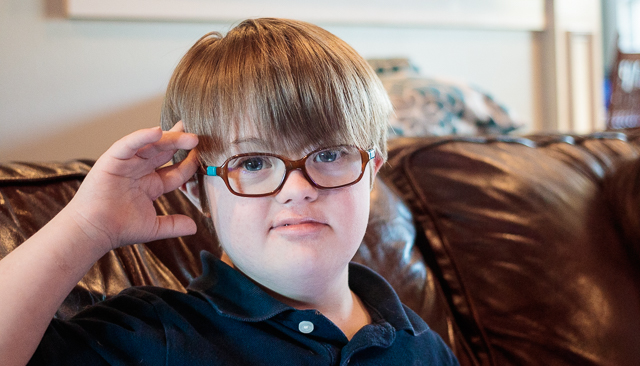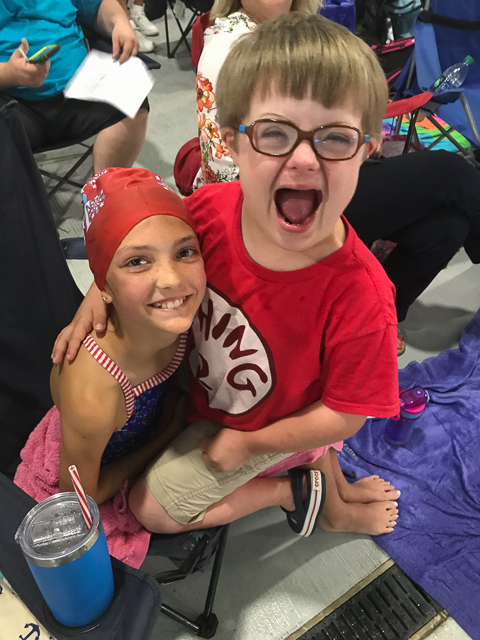
Have you ever heard someone with an intellectual disability described as having a level of understanding equivalent to a (fill in the blank)-year-old? A statement like that presumes that a person like Nathan follows the typical linear progression of development but at some point development stops for a person with intellectual disability – they hit a plateau and that’s it.
In some ways, it’s true. Nathan learned to sit before crawling, crawled before standing, and walked before running, all in the typical order. His speech development is (more or less) progressing in the same way as his peers, but at a much slower rate. Eventually he’ll catch up, although his anatomy makes it likely that he’ll always struggle with certain sounds and may never speak perfectly clearly. His fine motor skills also continue to improve, but the lower-than-normal tone in his muscles make it harder for him to control a pencil, or a fork, or a toothbrush.
But the brain is a funny thing.
I had a meeting with Nathan’s teachers last week to go over some recent testing. It covered a lot of areas – speech, behavior, academics, etc. – and one of those is essentially an IQ test. I have always hated these meetings because the whole point of them is to talk about all the ways in which your child isn’t able to do what typical kids can do. The testing showed exactly what I expected it to show – that Nathan falls in the mild intellectual disability range – and I expected to walk out of the meeting discouraged, but this time was different.
The nitty-gritty details on the pages told the story of a third grader who is reading on a second grade level (not terrible) but whose math skills are surpassed by most kindergarteners (pretty bad). But the truth of who Nathan is and what he is capable of doing was found in the discussion with the teachers and staff sitting around the table. He’s not good at math – that’s not in dispute – but the question of just how bad he is remains unanswered. Nathan loves school and loves to learn, but he loves those things because he wants every minute of life to be F-U-N fun. He’ll go along with a test or a lesson for awhile, but eventually he’s ready for the F-U-N fun, so it’s hard to tell the difference between when he stops understanding a concept and when he stops caring about it.

We all are willing to spend a lot more time doing or learning about things that interests us, and we tend to procrastinate or ignore things we don’t like. Nathan is no different in that respect, but the arc of his commitment pendulum swings wider than most. He is obsessed with trucks and machinery – with a special love for Monster Jam – so he’s verging on savant status when it comes to recognizing and differentiating an excavator from a backhoe or a bucket truck from a derrick. He also remembers where he has seen the aforementioned equipment around town. Recently, as he was riding past Mr. Andi’s old office, he pointed to the building and said “Bucket truck!” – Mr. Andi left that job in the summer of 2015 and as far as any of us can remember, Nathan hasn’t been there since.
His brain just doesn’t work the way typical brains work.
He can name the days of the week but has no real concept of what differentiates one day from the next other than “school day” or “church day” or “Chick-fil-A day” (we eat it nearly every Saturday morning for breakfast) or what order they go in. But by contrast, despite being short and sitting in the back seat his entire life, it’s been a running joke in our house for a couple of years that once Sarah Kate got her license she’d have to take her brother everywhere she went so she wouldn’t get lost. He recognizes landmarks and can give us turn-by-turn directions just as well as Siri when we’re on the way to any of our routine stops, while Sarah Kate doesn’t the have the first clue whether the nearest town is to the north, south, east, or west. Last Saturday all we had to do was not turn to the left or right once we passed a certain road (the one that goes to Chick-fil-A and/or the practice pool) and he instinctively knew we were headed toward the Interstate despite it still being a few miles away and not at all visible. The interstate is where big trucks are, of course.

Figuring out exactly what Nathan understands is also a challenge, as is understanding what he’s trying to say – in part because of his speech issues, but also because of his unconventional way of thinking. Recently, his classroom teacher had him read a book to the class, and I envision the experience being like watching Minion Kevin’s speech (“gibberish gibberish TRUCK gibberish gibberish”). But she had an idea. The next time he wanted to read his book to the class, she projected the pages onto the smart board so the kids could follow along…and the kids were stunned at how well Nathan could read. Because all they heard was gibberish, they assumed gibberish was what he was saying, but seeing the words as he spoke them opened their eyes to the fact that the problem wasn’t how well he reads, but how well he speaks. Sometimes Nathan’s abilities are simply hidden from view.
But Nathan’s real gift is in his ability to touch people.
I don’t mean that people are inspired by his tenacity or entertained by his antics. I mean that he has a knack for recognizing a need in someone and reaching out to fill it. I could never keep track of the number of times someone – sometimes a friend, but often a stranger – has said to me, “I needed that today!” in response to a hug or a smile or laughter that Nathan gave them. Not long ago, we were in a room with a number of strangers and he chose to sit next to one particular individual. I worried that he might annoy her or get into her personal space, but she assured me he was fine. After a few minutes he quietly started holding her hand, and although I hadn’t realized she was tense before, I saw her visibly relax. I don’t know what was bothering her that day, but Nathan made it better.

A part of me will always worry about people underestimating Nathan, dismissing him, or (worse) treating him poorly, simply because they don’t understand him and don’t bother to try. But what I’ve come to appreciate over the years is that some people will try to understand him, and they will be the people who will stay in his orbit and enjoy the sunshine that he brings.

I love Nathan too!
So awesome!
Yes, straight up generally means a highway or freeway, assuming no roundabouts. Or one of your Interstates.
[and of course there are BIG TRUCKS there!]
Made me think of Louise Kinross and her words about Global Developmental Delay.
And how we tend to privilege a certain way of speaking and how it seems to imply everything else so that you end up dispreferencing.
Yes, I see Nathan’s brain as a lot of preferences and dispreferences.
And that thing about the commitment pendulum.
And how with more-or-less typical brains caring and understanding seem to go together.
Wonderful points Andi! He is growing up!
“Sometimes Nathans abilities are simply hidden from view.” Yes, yes, yes! For reasons you know, I am one who stops and takes notice of him. I will never forget the note he left on his desk to you the first week of second grade. It inspired me on my own journey. And the happiness he gives his friends is like no other. He’s magic.
I am really happy that some people know how and have the time to put into words the truth about having a child with a disibility. He’s a handsome prince of a boy and will do well. I am going to share this beautiful story so as many people can read it as possible. I thank you and Taylor, my Princess , thanks you!
Yes. This is why the mental age theory is bunk.
Although I disagree that Nathan knows the way to the highway instinctively. He isn’t a bird. He knows the way because his particular brain is really good at maps and memorizing patterns and landmarks. I bet that he’d be better at geometry than arithmetic, too.
Why can’t you incorporate monster trucks into all his learning? Wouldn’t it be as simple as calculating the number of tires on a fleet instead of multiplying 4 by 6?
Everyone is intelligent. But (as someone famous don’t know who) once said, if you judge a fish by the ability to climb a tree, it will live it’s whole life believing it is stupid.
Nathan is empathetic, good at reading body language and nonverbal cues, reading, identification, so many things. Motor skills get in the way – get him a talker. As an adult with a developmental disability, I look forward to him joining our community and learning to self advocate for himself more as he grows older.
Ekie,
A future I didn’t know existed is a great introduction to this community which I for one greatly appreciate.
That fish and tree quote is all around the Learning Disability [US sense] community. It has some good wrinkles in it. Also I think a lot of the Animal School. When I went to Quote Investigator, I learnt that in 1898 Amos E. Dolbear wrote about the Animal School.
When it comes to highways and that visual-spatial world, there is a whole lot of underground processing which is very evident. You make a landmark and centralise from there, and/or you go to the edge. And lots of towns are very regular. Many are irregular. Some are a mix of both. I think of the acetate sheets which show levels/layers of accessed and unaccessed knowledge/learning.
Creating a transferable Monster Truck curricula would be of great help and service. Not only to Nathan and other students who learn in this broad way and some of the narrower paths.
Thank you, too, for Neuropsych testing which covers from an inside angle the lowering of self-esteem which takes place for too many.
I do not know if Nathan is already using a talker or similar accommodation for academic tasks like the reading out loud. Low tone and this sort of thing.
My first thought after reading this was…What a gift from God!